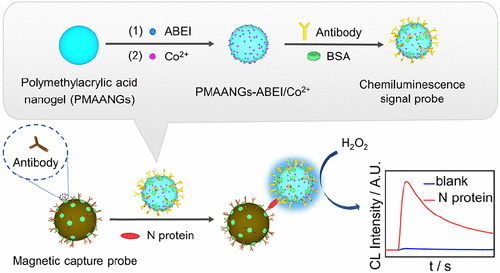Cui Hua

|
- Professor
- Supervisor of Doctorate Candidates
- Supervisor of Master's Candidates
- Name (English):Hua Cui
- Name (Pinyin):Cui Hua
- E-Mail:
- Business Address:环境资源楼-339
- Contact Information:0551-3600730
- Degree:Dr
- Professional Title:Professor
- Teacher College:Chemistry and Materials Science
 Contact Information
Contact Information
- Fax:
- OfficePhone:
- Email:
- Paper Publications
Chemiluminescent Nanogels as Intensive and Stable Signal Probes for Fast Immunoassay of SARS-CoV-2 Nucleocapsid Protein
Release time:2023-07-01 Hits:
- DOI number:10.1021/acs.analchem.2c03055
- Journal:Anal. Chem.
- Abstract:It is highly desired to exploit good nanomaterials as nanocarriers for immobilizing chemiluminescence (CL) reagents, catalysts and antibodies to develop signal probes with intensive and stable CL properties for immunoassays. In this work, N-(4-aminobutyl)-N-ethylisoluminol (ABEI) and Co2+ bifunctionalized polymethylacrylic acid nanogels (PMAANGs-ABEI/Co2+) were synthesized via a facile strategy by utilizing carboxyl group-rich PMAANGs as nanocarriers to immobilize ABEI and Co2+. The obtained PMAANGs-ABEI/Co2+ showed extraordinary CL performance. The CL intensity is 2 orders of magnitude higher than that of previously reported ABEI and Cu2+–cysteine complex bifunctionalized gold nanoparticles with high CL efficiency. This was attributed to the excellent catalytic ability of Co2+ and polymethylacrylic acid nanogels, as well as the improved CL catalytic efficiency from a decreased spatial distance between ABEI and the catalyst. The as-prepared nanogels also possess abundant surface reaction sites and good CL stability. On this basis, a sandwich immunoassay for the nucleocapsid protein of SARS-CoV-2 (N protein) was developed by using magnetic bead connected primary antibody as a capture probe and PMAANGs-ABEI/Co2+ connected secondary antibody as a signal probe. The linear range of the proposed method for N protein detection was 3.16–316 ng/mL, and its detection limit was 2.19 ng/mL (S/N = 3). Moreover, the developed immunoassay was performed with a short incubation time of 5 min, which greatly reduced the detection time for N protein. By using corresponding antibodies, the developed strategy might be applied to detect other biomarkers.
- First Author:屈发进
- Co-author:Mohammad A. Haghighatbin,王珊珊
- Indexed by:Journal paper
- Correspondence Author:shujiangnan,Hua Cui
- Discipline:Natural Science
- Document Type:J
- Volume:94
- Issue:49
- Page Number:17073–17080
- Translation or Not:no
- Date of Publication:2022-11-30
- Included Journals:SCI
- Links to published journals:https://pubs.acs.org/doi/10.1021/acs.analchem.2c03055


